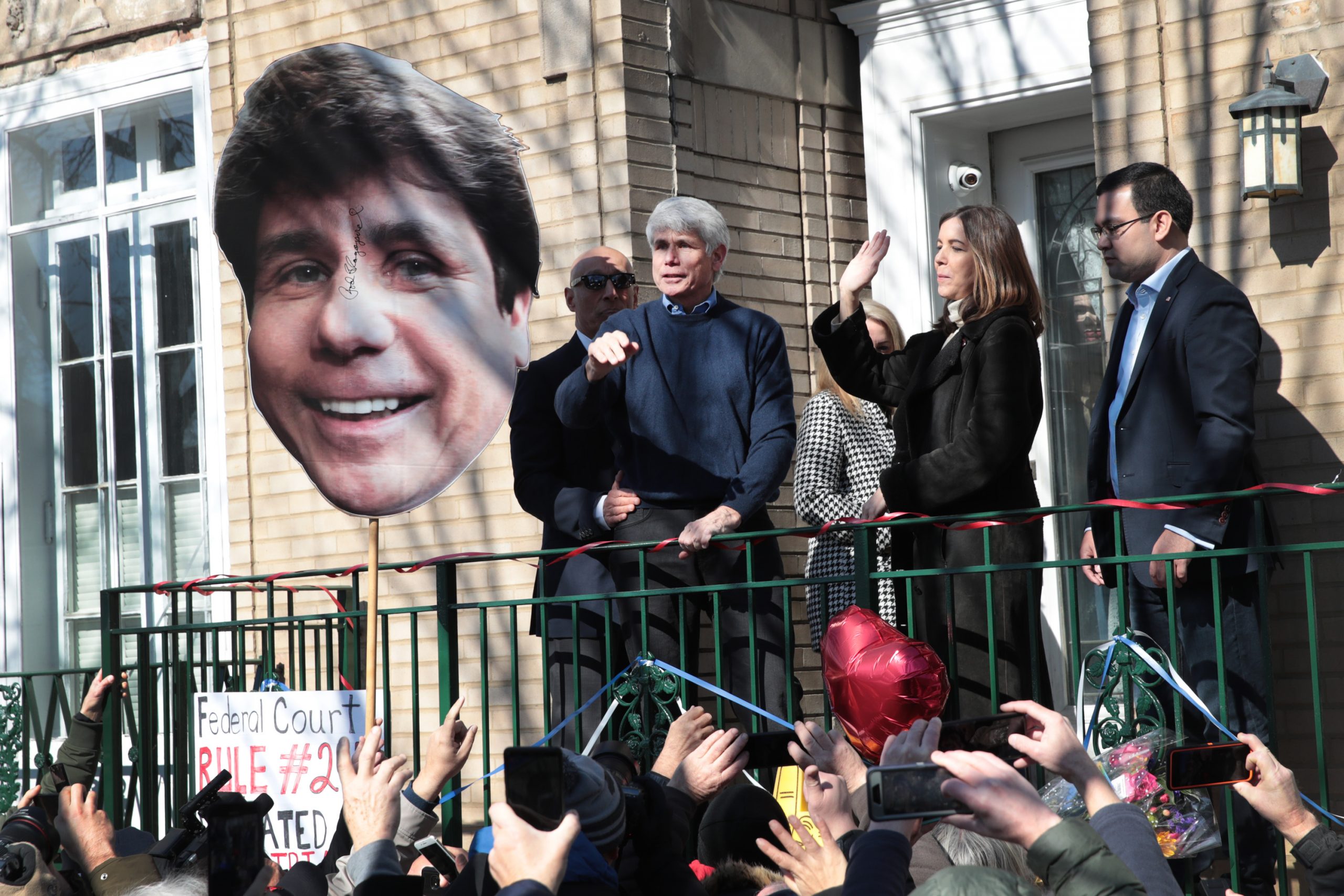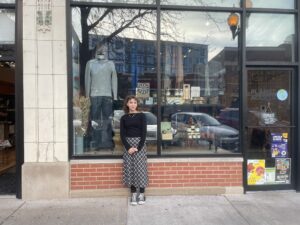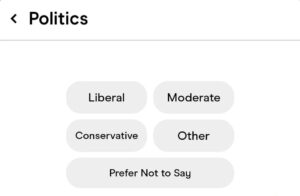Disgraced former Illinois Gov. Rod Blagojevich called himself a “freed political prisoner” the morning after being released from prison and thanked President Donald Trump for commuting his 14- year sentence on corruption charges.
“We want to express our most profound and everlasting gratitude to President Trump,”
Blagojevich said from outside his home in Chicago. “He didn’t have to do this…this is an act of kindness.”
In 2011, Blagojevich was accused of trying to sell Barack Obama’s U.S. senate seat and was later charged and convicted of corruption. He served about half of his sentence in a Colorado prison before Trump intervened and commuted the remaining time. He was due to be released in 2024, with two years off for good behavior.
Not all Chicago residents welcomed him home as the political victim he made himself out to be in a press conference Feb. 19 outside of his Ravenswood home on the north side of Chicago.
“I remember voting for Blagojevich the very first time I ever voted,” said Sherry Johnson, a resident of the Lincoln Park neighborhood. “I remember I believed in his campaign and the things that he was saying he could do for our state, but when they kicked him out of his spot I was so betrayed as a voter. All of the things he had been accused of doing made him look so horrible, and we know that, in turn, made us look like we’d helped him get there.”
Sam Rowe, a graphic designer from Chicago, called it a “disgrace” for Blagojevich not to serve out his full sentence. “This person who is pardoned for no other obvious reason besides the president’s sympathy with white collar criminals,” Rowe said. “It’s a clear miscarriage of justice, as far as I can see.”
Blagojevich was held at a low-security Federal Correctional Institute in Englewood, Colorado. He spoke to the media outside of his Ravenswood home about how he felt seeing his children, who grew up during his time spent in prison. His oldest daughter is now 22 and his younger daughter is now 16.
“I’m thankful to you, Mr. President for giving my daughters their father back,” he said. “My daughters are growing up,” he added.
Trump had hinted that he wanted to commute Blagojevich’s sentence, telling reporters and others that the former governor had been mistreated and served enough time in jail. “He’ll be able to go home to his family after serving eight years in jail, that was a tremendously powerful, ridiculous sentence in my opinion,” Trump said.
Blagojevich was swooning over Trump after he was released. “He’s got obviously a big fan in me,” Blagojevich told reporters at Denver International Airport before leaving to return home to Chicago. “And if you’re asking me what my party affiliation is, I’m a Trumpocrat,” he added. Blagojevich and Trump know each other previously from when Blagojevich was featured in 2010 on The Celebrity Apprentice, one of Trump’s former reality television shows.
“I feel like there is a plot behind it, political gain,” said Portia Jones, a receptionist in Chicago. “Rod Blagojevich is a Democrat, Trump is a Republican so letting him out of prison is intended to gain the Democratic vote for the next election.’”
In 2008, Blagojevich was also accused of withholding funds from an Illinois children’s hospital in exchange for political campaign contributions. For some Illinois residents, this is the standout crime in the former governor’s rap sheet.
“Rod held money from a children’s hospital caring for some of the most amazing and brave children with life-threatening illnesses,” said Eric Suarez, a 29-year-old from Melrose Park outside of Chicago. “Justice was not served for this crime. Those kids deserve the best and under the table deals shouldn’t have to be made to find funds just to help them.”
Blagojevich was an Illinois state representative before becoming a congressperson in 1997, where he served for six years as a Democrat. Selling himself to voters as the “anti-corruption candidate,” Blagojevich won the election for Illinois governor in 2002 and was elected to a second term in 2006. After denying any wrongdoing for years, legal troubles caught up to Blagojevich in 2007. He was arrested on federal charges just 13 months after he began his second term as governor.
He was convicted on 18 charges of corruption and sentenced to 14 years in prison on June 27, 2007. He admitted guilt and offered apologies to the trial judge and his family as well as the Illinois residents he served as governor. His sentence was uniquely severe and was thought of as a direct message to legislators that it was time to end the longstanding corruption prevalent in Illinois politics. Preceding the sentencing, Blagojevich capitalized on the attention and solidified himself as a national figure appearing on talk shows.
“I think this is a testament to the racist culture that’s been more apparent under Trump,” said Briana Madden, a substitute teacher from Lawndale. “Blagojevich’s white privilege got him a ticket to freedom while so many black and brown bodies rot in jail and are exploited through the prison labor system.”
John Christensen, a 59-year-old librarian from Chicago, said the release of the former governor shows that Trump doesn’t care about corruption.
“He’s pardoning these white collar criminals mostly, but it seems that most people like him that are rich are committing crimes,” he said. “I don’t feel good about it.”
But Matt Taupin, a 73-year-old accountant from the Old Town neighborhood, said he was happy Blagojevich was home. “He’s with his two daughters and his wife,” Taupin said. “His wife’s been pleading for years for him to be released. He made a mistake that sent him away. I feel like he served more than enough time. So yeah, I’m happy he’s out now.”
Carly Young, Jenna Grayson, Fiona Good-Sirota, Mary Filatova, Martin French, Scott Barnes, Keyaria Lovett, Myer Lee Turner, Valeria Mancera-Saavedra, Marianna Koonce, Taylor Cameron and Olivia Paus contributed to this story.












Be First to Comment